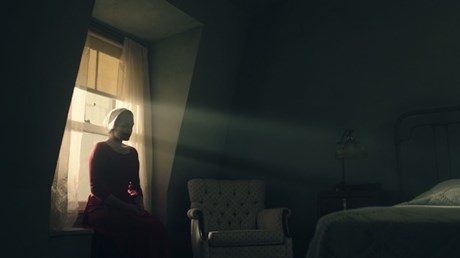The question is: Which one?

It’s no coincidence that The Handmaid’s Tale, the Hulu original series based on the Margaret Atwood book of the same name, is being released now, more than 30 years after the book’s publication. Capitalizing upon a the parallels between its fictional American dystopia and the distress that many people feel at the current state of American politics, The Handmaid’sTale has been celebrated as a timely entry into the conversation about where we are headed as a nation. In particular, the show makes an uncomfortable connection between the contemporary political language of a “war on women”, as heard in the last several presidential election cycles, and the actual war on women in The Handmaid’s Tale, where women are enslaved, mutilated, raped, beaten, and killed.
The villains of The Handmaid’s Tale are fundamentalist Christians who, after a violent revolution, run a totalitarian theocratic republic called Gilead in place of the secular state—an echo of the Islamic Republic established in Iran after the 1979 Revolution, around the time when Atwood penned her novel. The highest function of women in this fearful new world is to bear children. Infertility and infant mortality rates, however, are through the roof, so when a member of the pious ruling class cannot have a child, the state sends her a “handmaid” to conceive in her place.
The handmaid system provides sexual surrogacy, the depiction of which, once seen, will not soon be forgotten—especially as it is set against a track of “Onward Christian Soldiers” in the show’s most heavy-handed moment. The whole scenario is reminiscent of the story of Hagar in the Old Testament, in which Sarah arranges …
Source: Christianity Today Most Read